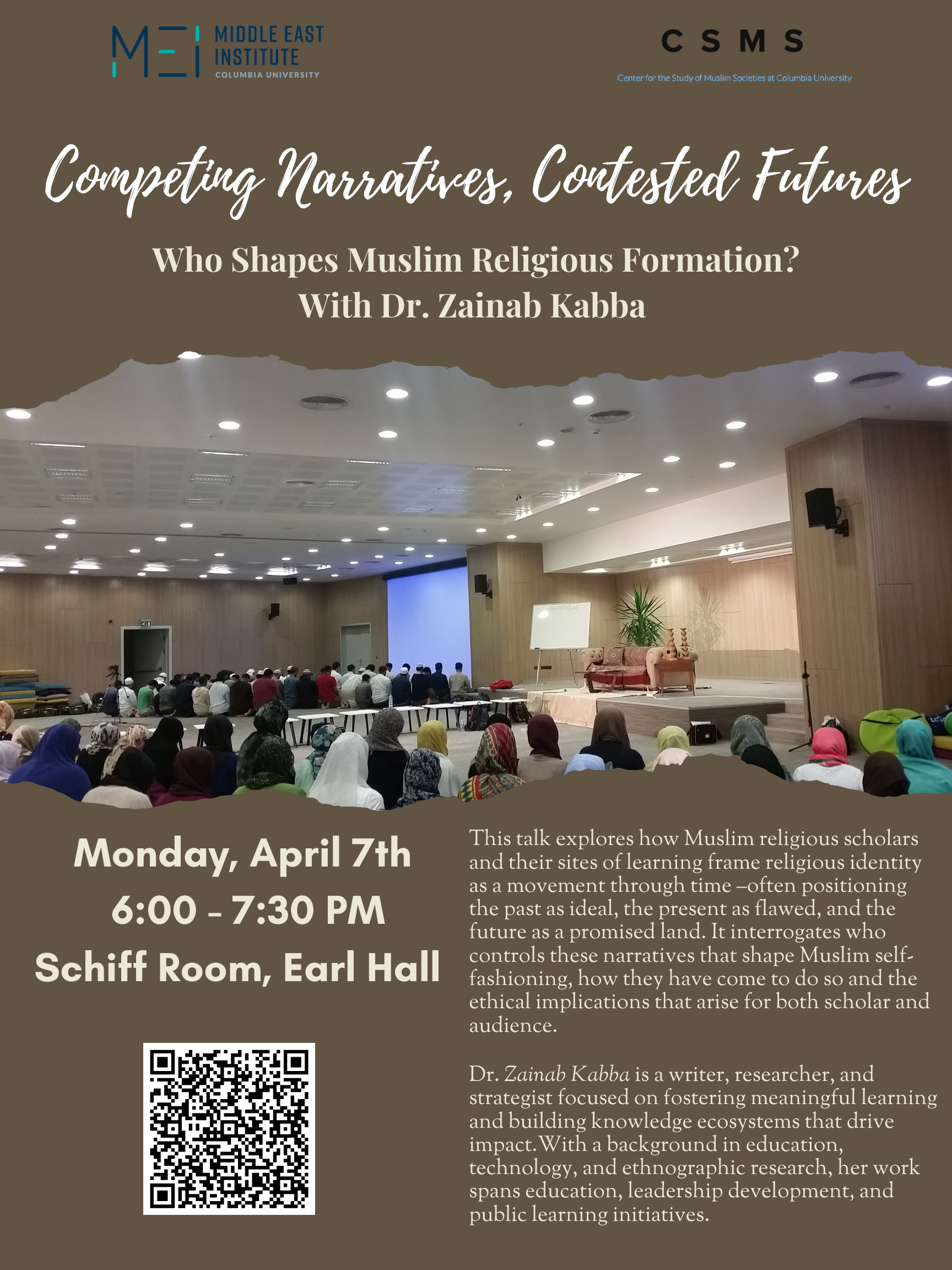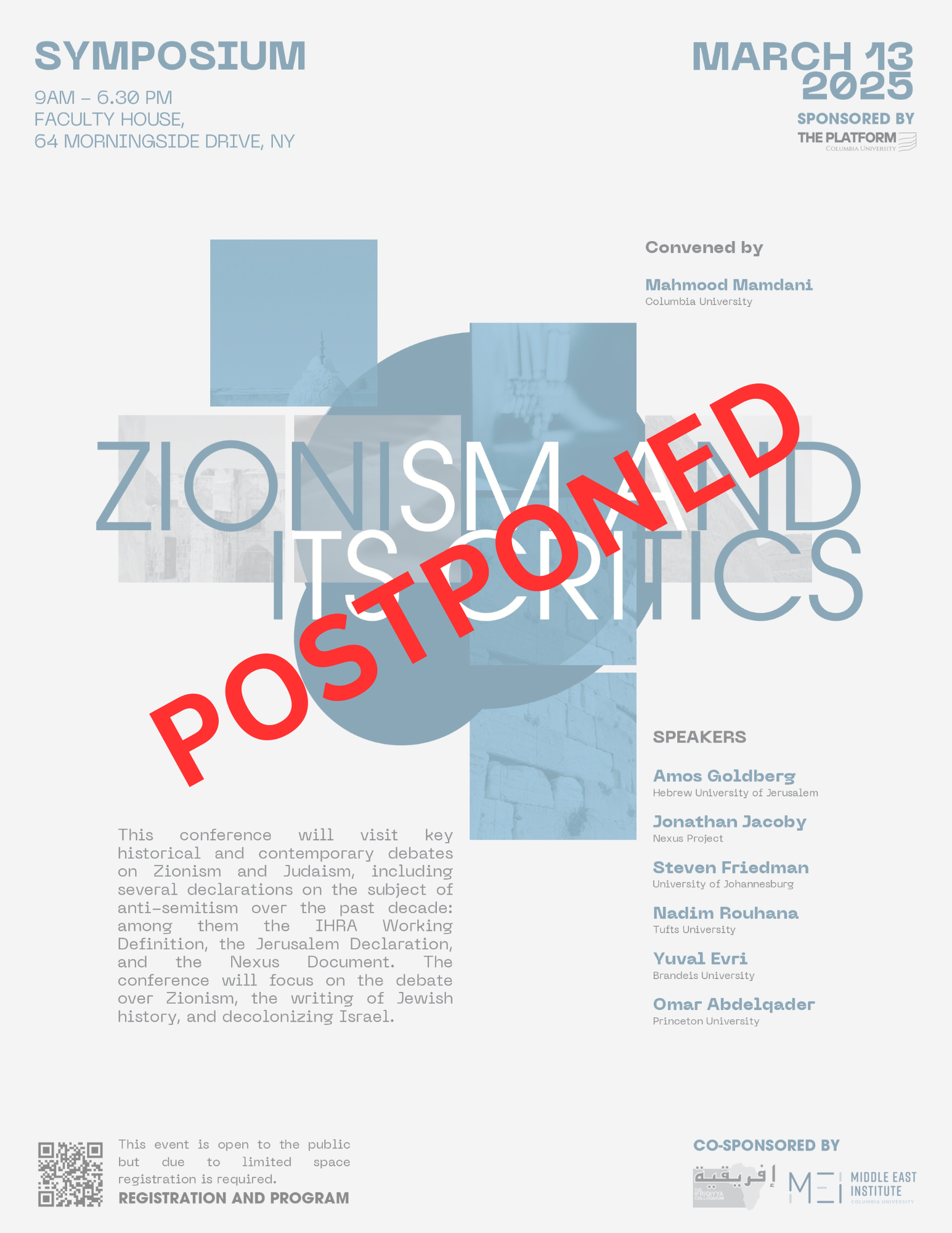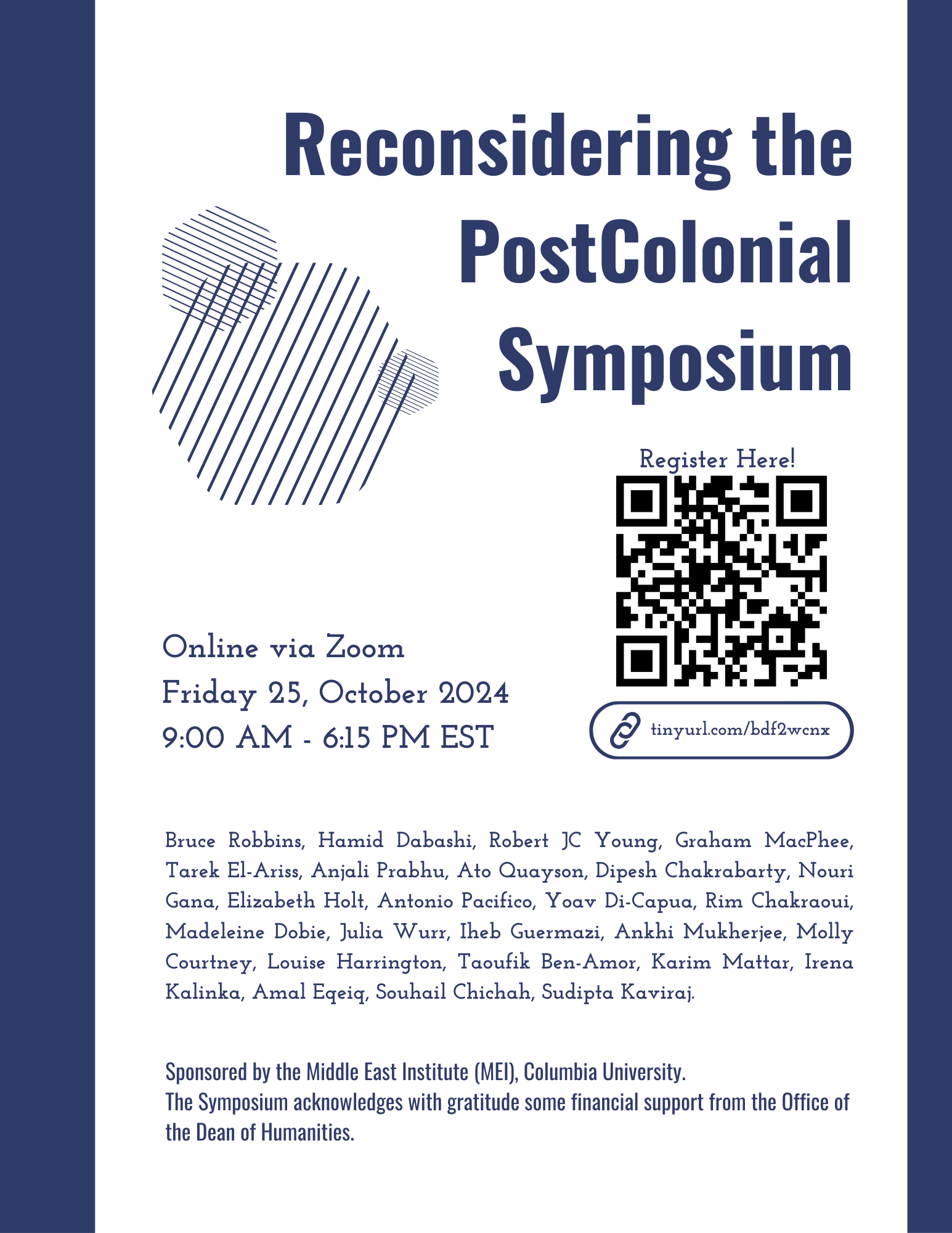Date: Monday, December 9
Time: 3:00 PM - 8:15 PM
Location: Maison Française, Buell Hall, 515 W 116th St
Organized by The Platform, a Columbia University-based initiative dedicated to promoting discussion and reflection on contemporary global issues. Co-sponsored by The Middle East Institute.
This series focuses on Palestine and the arts, aiming to historicize the enduring legacies of poetry, literature, music, art, and theatre, while also showcasing new works that address themes of displacement and settler-colonial violence. Focusing on Columbia’s Morningside campus, Harlem, and the broader New York community, the series invites audiences to engage with artistic representations of Palestine—not as a counter to war imagery but as a lens to understand why art is a threat to empire. Second, the series itself is a way of reclaiming space - to speak about Palestine. After a year of living under the Palestinian exception, where rules were changed, cops were called, students were suspended and arrested, we offer this platform as a way of healing.
Convened by: Mahmood Mamdani and Shayoni Mitra
Poster Art: Layal Srouji
Program
3:00-4:15: Writing and Teaching in Gaza: Dr. Refaat’s Legacy
Moderated by Thea Abu ElHaj
Jehad Abusalim
Yousef Aljamal
Eman Bashir
4:15-4:45:Coffee and Readings
Reading by CU, BC students
Coffee by Qawwah House
4:45-6:00: Black Palestine and Transnational Solidarities
Moderated by Frank Guridy
Marc Lamont Hill
Maytha Alhassen
Ali Mir
6:00-7:00: Dinner service by Abu Ras
7:00-8:15: Writing Against Disappearance: Contemporary Writers
Moderated by Bahia Munem
Yahya Ashour
Hind Shoufani
Jumana Manna
Participants’ bios
Jehad Abusalim - Jehad Abusalim, originally from Deir el-Balah in the Gaza Strip, is the Executive Director of the Institute for Palestine Studies-USA in Washington, DC. He co-edited Light in Gaza: Writings Born of Fire (Haymarket Books, 2022). His work has been featured in The Washington Post, Al-Jazeera, The Nation, and more, and he has appeared on platforms like Al-Jazeera, CNN, and Democracy Now!
Maytha Alhassen - Maytha Alhassen is a Writer/PRoducer, journalist, professor and a pop Culture collaborative senior fellow (authoring the HAQQ AND HOLLYWOOD: ILLUMINATING 100 YEARS OF MUSLIM TROPES AND HOW TO TRANSFORM THEM (2018) report) Who appeared as a CO-HOST on the Young Turks’ “main hour” + as a guest co-host and digital producer on Al Jazeera English’s “The Stream.” Alhassen is a Co-Executive producer, writer, and social impact advisor for Hulu’s award-winning series “Ramy,” a stanford lecturer in comparative studies in race and ethnicity, a 2021-2024 havard religion and public life fellow in Art + Pop Culture, executive Producer of the docu-series “American Muslims: A history revealed,” a pillars muslim narrative change fellow, a USC 2022-23 Civic Media Fellow, host of new educational web series "Key terms” (part of “Office hours” series), Co-Host of Amazon Music and salt audio meditation podcast BECOME, and a former Ted resident (2017).
Yousef Aljamal - Yousef Aljamal is the Gaza coordinator at the Palestine Activism Program at the American Friends Service Committee (AFSC). Aljamal is a refugee from Al-Nusierat refugee camp in the Gaza Strip. He recently received his PhD at the Middle East Institute at Sakarya University in Turkey.
Yahya Ashour - Yahya Ashour | يحيى عاشور is an exiled Gazan poet and awarded author, born on April 22, 1998, based in the US. He is an honorary fellow at the University of Iowa and the author of the e-book “A Gaza of Siege & Genocide” (Mizna, 2024). Ashour's portfolio also includes poetry collections, children's books in Arabic, and contributions to global anthologies and journals, including MQR and ArabLit. He has received multiple scholarships and fellowships and has read poetry at over 50 U.S. organizations and universities, including Princeton, Stanford, UPenn, and UCLA. His poetry has been translated into several languages, including Spanish, French, Japanese, and Bengali. Ashour studied Sociology & Psychology and worked as a creative writing mentor.
Eman Bashir - Eman is a writer, researcher, and former English teacher from Gaza. She is a mother of three and a published author whose work has appeared in Vice Magazine, Electronic Intifada, The Washington Post, and Vittles. Currently pursuing her academic interests, she focuses on Palestinian narratives, cinematography, and the intersections of identity and resistance in visual storytelling.
Thea Abu ElHaj - Thea Renda Abu El-Haj, Professor of Education at Barnard College, Columbia University, is an anthropologist of education. Abu El-Haj’s research explores questions about belonging, rights, citizenship, and education raised by globalization, transnational migration, and conflict. Funded by the Spencer Foundation, her current research entitled, “Disrupting Dispossession: Teaching Palestine in Exile, 1970-1990” is an oral history project with Palestinian teachers in Lebanon. The project explores Palestinian teachers’ roles as everyday political and civic actors in the anti-colonial movement. She was principal investigator of a US national interview study exploring the civic identities and civic practices of youth from Muslim immigrant communities also funded by the Spencer Foundation. Abu El-Haj is past-President of the Council on Anthropology and Education of the American Anthropological Association. Her second book, Unsettled Belonging: Educating Palestinian American Youth after 9/11, is an ethnographic account of young Palestinian Americans grappling with questions of belonging and citizenship in the wake of September 11, 2001.
Frank Guridy - Frank Andre Guridy is the Dr. Kenneth and Kareitha Forde Professor of African American and African Diaspora Studies. He is also Professor of History and the Executive Director of the Eric H. Holder Initiative for Civil and Political Rights at Columbia. He is an award-winning historian whose recent research has focused on sport history, urban history, and the history of American social movements.
Mahmood Mamdani - Mahmood Mamdani is the Herbert Lehman Professor of Government. He was also professor and executive director of Makerere Institute of Social Research (2010-2022) in Kampala, where he established an interdisciplinary doctoral program in Social Studies. He received his PhD from Harvard University in 1974 and specializes in the study of colonialism, anti-colonialism and decolonisation. His works explore the intersection between politics and culture, a comparative study of colonialism since 1452, the history of civil war and genocide in Africa, the Cold War and the War on Terror, the history and theory of human rights, and the politics of knowledge production.
Jumana Manna - Jumana Manna is a visual artist and filmmaker. Her work explores how power is articulated, focusing on the body, land and materiality in relation to colonial inheritances and histories of place. Through sculpture, filmmaking, and occasional writing, Manna deals with the paradoxes of preservation practices, particularly within the fields of architecture, agriculture and law. Her practice considers the tension between the modernist traditions of categorisation and conservation and the unruliness of ruination, life and its regeneration. Jumana was raised in Jerusalem and lives in Berlin.
Marc Lamont Hill - Dr. Marc Lamont Hill is one of the leading intellectual voices in the country. He is currently the host of BET News, The Grio, Al Jazeera UpFront, and the Coffee & Books podcast. An award-winning journalist, Dr. Hill has received numerous prestigious awards from the National Association of Black Journalists, GLAAD, and the International Academy of Digital Arts and Sciences. Dr. Hill is a Presidential Professor of Anthropology and Urban Education at the City University of New York Graduate Center. Prior to that, he held positions at Morehouse College, Temple University, and Columbia University.
Shayoni Mitra - Shayoni Mitra is a senior lecturer at the Department of Theatre, Barnard College, Columbia University. She teaches classes on performance studies, feminist theory, political performance and postcolonial drama. She has written extensively on student protests, and her writings appear in various journals and collected volumes. She is currently director of the South Asia Institute at Columbia University, and director of the Barbara Horowitz Scholars of Distinction program at Barnard College. Mitra is a member of the Delhi-based street theatre group Jana Natya Manch. For academic year 2023-24 she convened, with colleagues and students, weekly readings of the Palestine Poetry Collective.
Ali Mir - Ali Mir is a professor of management at William Paterson University. He is the co-author of “Anthems of Resistance” and a writer and lyricist for Indian films.
Bahia Munem - Bahia M. Munem’s teaching and research interests examine race and ethnicity as they intersect with gender, sexuality, class, nation, religion, and diasporas. Her scholarship bridges the fields of Latinx, Latin American, and Middle East Studies by examining forced transnational migration and gendered and racialized modes of belonging in the Americas.
Hind Shoufani - Hind Shoufani is a Palestinian filmmaker & poet, living in Brooklyn. For over 25 years, she’s worked across the Arab world as a documentary director, producer & editor. She has an MFA in film from NYU.Hind’s poems & essays have been published internationally & her first poetry collection in the US with Diode Editions is forthcoming in 2025.
Layal Srouji - Layal Srouji is a Palestinian artist, student, and memory worker based in New York City. She studies in the School of Arts at Columbia University, where her creative practice and academic work explore themes of resistance, material culture, and the politics of archives. Layal's projects often draw from Palestinian histories and global textiles, weaving together storytelling, advocacy, and visual art.






































